
October-December 2017
Editorial: Capacity Building

Capacity building is fundamentally the process by which individuals and organizations acquire new skills and knowledge; or improve the existing ones that are required to do their jobs competently. Most simply, capacity building improves performance and enhances the ability of an individual and also an organization to function and continue to stay relevant within a rapidly changing environment. We know that capacity building and capacity development are not the same. Capacity development recognizes people's existing capacity, which requires improvement.
Capacity development is intrinsically linked with maintaining quality, unless this is being made a continuous process, an organization loses its quality, which can be both harmful and costly. Without appropriate capacity, resources are often overused, misused or underused. This can place a heavy financial and human burden on any organization. As a social development organization, BCCP believes in developing capacity in a holistic manner, and as a part of its effort, BCCP offers various trainings and workshops to enhance organizational as well as individual capacity, including ‘Advances in Strategic Communication Workshop, ’ which is being offered to develop future leaders in the field of Strategic Communication in Bangladesh.
Comprehensive HPN SBCC strategy is a milestone initiative for MoHFW - Md. Ruhul Amin Talukdar
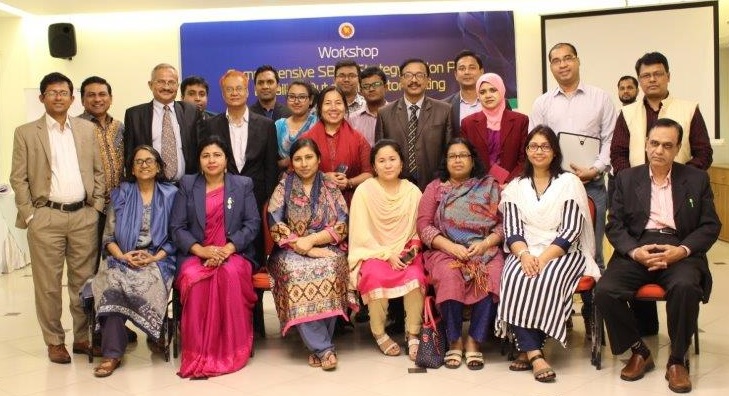
Health, Population and Nutrition (HPN) units of the Ministry of Health and Family Welfare (MoHFW) has come up with an action plan following the Social and Behavior Change Communication (SBCC) strategy in a 2-day workshop held in BCDM, Savar on December 13-14, 2017. While inauguration of the workshop Mr. Md. Ruhul Amin Talukdar, Joint Secretary (PH-2), Ministry of Health and Family Welfare termed this strategy as a milestone initiative for the Ministry, he further emphasized the need for proper and planned implementation of the strategy linking community with the facility integrated with messaging and materials, effective counseling and coordinated campaigns.
With the technical assistance from Ujjiban-BCCP project, this workshop was attended by 27 different levels of HPN unit level officials and they came up with a detail action plan at the end of the workshop. This action plan has also set up an indicator for each of the activity and pointed out respective responsible units for implementation with specific timeline. It is believed that this action plan will work as a common document for implementation of SBCC activities by different units that will contribute to the community’s health seeking behavior and increase customer flow at the service delivery sites.
Consultative Workshop to Identify the Future Tobacco Control Research Needs in Bangladesh Held
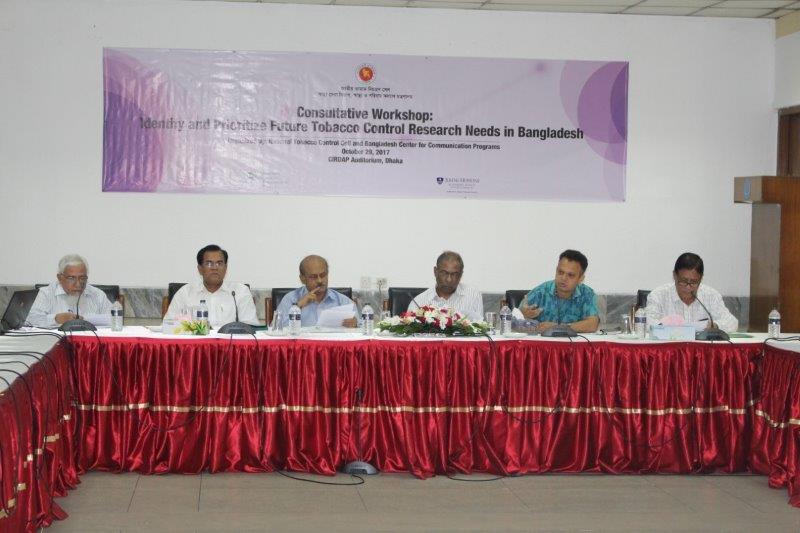
Bangladesh Center for Communication Programs (BCCP) and National Tobacco Control Cell jointly organized a Consultative Workshop to Identify and Prioritize the Future Tobacco Control Research Needs in Bangladesh. The Consultative Workshop was held on October 29, 2017 at CIRDAP auditorium, Dhaka. Around 40 professionals represented by the Ministry of Health and Family Welfare, public and private universities, BI partners and grantees and other organizations working on tobacco control attended the workshop. In the workshop, the participants took part in four groups, identified the future tobacco control research needs in Bangladesh and presented in the plenary.
Mr. Muhammad Ruhul Quddus, Joint Secretary & Coordinator, National Tobacco Control Cell, Health Service Division, Ministry of Health & Family Welfare attended the workshop as the Chief Guest while Mr. Saiful Hasan Badal, Joint Secretary (WHO), Health Service Division, Ministry of Health and Family Welfare; Dr. Syed Mahfuzul Huq, National Professional Officer, World Health Organization, Bangladesh; Mr. Shafiqul Islam, Bangladesh Representative, Vital Strategies; and Mr. Syed Mahbubul Alam Tahin, Technical Advisor, The Union attended the workshop as the Special Guests.
Participation of IMED at Digital World 2017
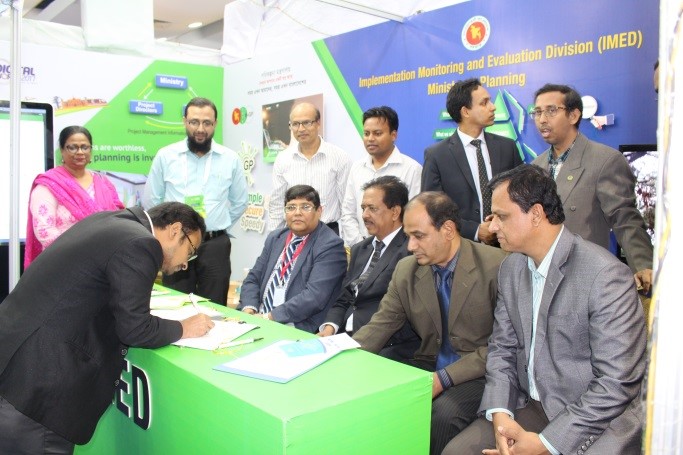
Ever since 2012, the largest platform for Information Technology was created under the vision of Bangladesh Government. All the government and non-government ministries and private agencies have come forward and presented their digital affairs by taking part in the Digital Fair 2017. Digital World 2017 – with the slogan “Ready for Tomorrow” was organized by ICT with the valuable cooperation of Bangladesh Computer Council (BCC), Bangladesh Association of Software and Information Services (BASIS) and Access to Information Program (a2i).
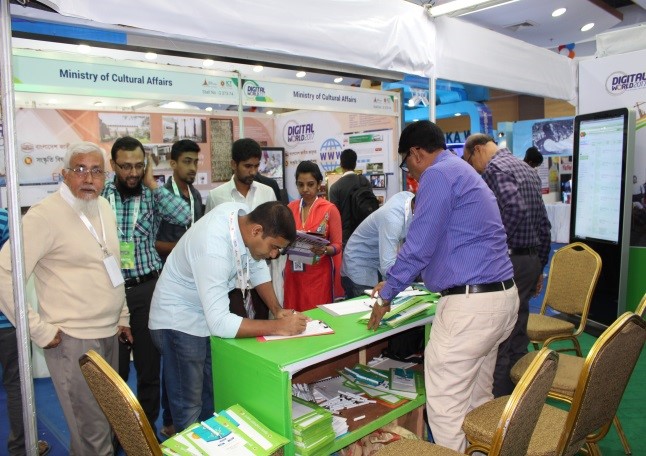
Implementation Monitoring and Evaluation Division (IMED) and Central Procurement Technical Unit (CPTUD) highlighted the technical advancement and progress in a stall located at the Fair. The reason behind the presentation was to uncover the variety of activities conducted by IMED and its valuable contribution, progress of e-GP and innovations related to Public Procurement to all those people attending the Digital Fair 2017. On behalf of IMED, BCCP presented the stall and took the responsibility to organize and manage the stall energetically.
Live mobile Application and Digital panel was used to present the progress of e-GP. E-Gp Registration Flyer, IMED Brochure and e-GP pens were distributed amongst almost 6000 attendees at the Digital Fair 2017. Secretary of IMED - Mr. Mohammad Mafizul Islam, Director General of CPTU Mr. Mohammad Faruk Hossain, BCCP Director and CEO Mr. Mohammad Shahjahan and other officials of IMED and CPTU have visited the stall. The Digital Fair 2017 was organized from the 6th to 7th of December, 2017 at Bangabandhu International Conference Center in Dhaka.
Student & Police Engagement-Student Leadership Development Workshops Program(CTG)
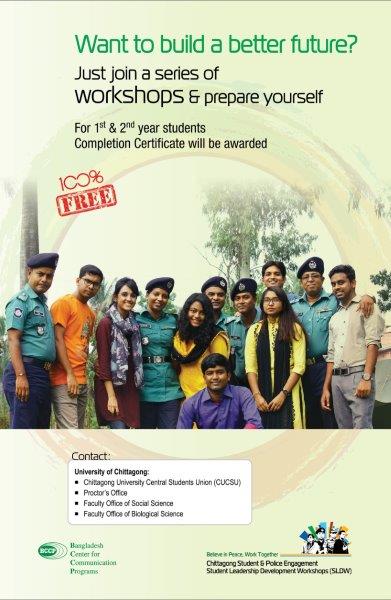
“Chittagong Student & Police Engagement - Student Leadership Development Workshops Program” is one of the major programs directed at the youths of the society implemented by Bangladesh Center for Communication Programs (BCCP). The program will entail 6 theme based workshops and 1 seminar, each in three selected universities/college in Chittagong and other relevant activities. Participants will include both students from the selected institutions and selected Police members from the community.
The need for such an intervention has stemmed from the necessity to develop a mutually respectful partnership between police and the communities they serve to identify and address the root causes of instability and violence in our society. It is a known fact that social change is driven by the youth of a country. An effective way of preventing negative ideologies among the youth is for young people/students to learn to work with the police to promote a peaceful society.
This program focuses on shaping the perceptions of university students and their organizations, initiating dialogue on violent extremism and radicalization, and inter-religious affairs, encouraging non-violent conflict resolution; and enhancing student and police engagement. In the process, among other things, participants will be empowered to become key communicators and future civic leaders, create a network for the exchange of ideas and contribute to capacity building of student organizations. They will also be equipped with the necessary skills including life skills for career development.